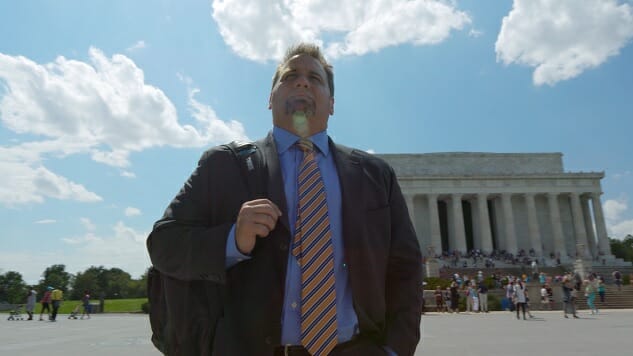
For those of us with staunch disinterest in the mechanics of finance and economics, movies that focus on either (or worse: both) tend to look and feel an awful lot like a brick wall. They’re too dense, each brick too tightly packed against the rest, the mortar gluing them together too solid. Bust through one and you’ll still have the rest staring you in the face. It’s a hopeless task. Still, the matters of fiscal flimflam and commercial collapse are too important to justify our ignorance of them, so it’s up to filmmakers like Jed Rothstein to translate the physics of a con into a language the uninformed can understand. Sometimes that language means putting experts in front of the camera and letting them talk. Sometimes it means showing the audience an educational cartoon.
In the case of The China Hustle, Rothstein’s new film, it means jamming talking heads and cartoons into one brisk package, spurring on his viewer’s outrage without mystifying us or insulting our intelligence. In a roundabout way, The China Hustle’s density facilitates its cause: Allocating himself just an hour and twenty minutes to break down Wall Street’s blind-eyed endorsement of monetary hanky panky between crumbling American companies and avaricious Chinese companies, Rothstein untangles a complex web of scumbag villainy into mere threads of scumbag villainy that even the most economically disinclined among us can wrap our lizard brains around. There are too many moving parts in financial fraud to ever fully simplify financial fraud, but The China Hustle does a bang up job trying to get there anyways.
Here’re the basics: Back in 2008, when Americans were acclimating to the idea of living through a recession, investors caught with their pants around their ankles by the subprime mortgage cataclysm decided that recouping their losses in the first fraud by accepting a shiny brand new fraud made sound economic sense. Enter China. Throughout the 2000s, hundreds of Chinese companies started showing up on U.S. financial exchanges through the magical process of the reverse merger, in which the Chinese business merged with dead or dying American business that already enjoyed official listing. Sounds great, if you’re a sucker! See, the reverse mergers let these newly minted enterprises sell their stock while skirting around U.S. security regulations.
Whether you’re an econ master or not, you can probably figure out where this is going: The folks behind these companies lied to their foreign investors and to the SEC, reporting completely B.S. assets and revenues, thereby inflating stock prices, and with prices skyrocketing, every crook in on the scheme sold their shares, profited, and put the poor saps targeted by the scheme over a barrel. Again.
If all of this sounds dry on paper, it’s remarkably propulsive and even entertaining on the screen. Rothstein is a student from the school of Alex Gibney, who here serves as an executive producer; his name’s also on The New Yorker Presents and Parched, a pair of documentary TV series for which Rothstein directed episodes between the years of 2015 and 2017. If you’re familiar with Gibney’s bone-dry, over-obvious approach to documentary filmmaking, you may detect traces of his influence in Rothstein’s work, but Rothstein has a sense of humor and a flair for cheeky amusement that keeps The China Hustle engaging and on track, found in his editing choices and occasionally in his choice in format. An old-timey animated segment, for instance, that explains the concept of shorting (the sale of an asset you don’t own for its current price just to repurchase that asset later at a lower price) absolutely slays.
So do those talking head interviews, but mostly because Rothstein chooses his subjects wisely. His star, Dan David, is so charming, so charismatic and such a compelling storyteller that you’ll almost wonder why Rothstein didn’t just center the movie on him and him alone—“almost” because again: The material is dense. It takes more than one perspective to unravel the logistics of economic chicanery, so Rothstein includes ex-investment banker Matthew Wiechert and short seller Carson Block, who runs a firm called Muddy Waters Research, where the mission is to root out fraudulent companies and expose them. (Also appearing: Wesley Clark, decorated General, erstwhile Rodman & Renshaw chairman and total coward when Rothstein’s camera is fixated on him and his investment banking activities.) Their accounts and reminiscences of their experiences with reverse mergers amuse as easily as they enrage.
But for Rothstein it all comes back to Dan, the short-selling crusader who takes his cause right to Washington, where The China Hustle hits us with the hardest truth of all: The people in charge and vested with power to protect us from financial harm don’t care enough to do their jobs. Either that or they just don’t believe the facts. It’s a comfort of sorts to know that guys like Dan are out there in the world, raising a ruckus over the fraud China continues to perpetrate on the American public, but they keyword here is “continues.” As the film ends, the fraud goes on, expedited, perhaps, by the presidency. (Rothstein knows what he’s doing when he includes footage of Trump meeting with Alibaba executive chairman Jack Ma.) The China Hustle handily clarifies opaque topics and moves like a bullet, but the bullet catches us right in the gut. By the time the film ends you’ll wish you could go back to being ignorant again.
Director: Jed Rothstein
Starring: Dan David, Carson Block, Matthew Wiechert, Wesley Clark
Release Date: March 30, 2018
Boston-based culture writer Andy Crump has been writing about film and television online since 2009, and has been contributing to Paste since 2013. He also writes words for The Playlist,WBUR’s The ARTery, Slant Magazine, The Hollywood Reporter, Polygon, Thrillist, and Vulture, and is a member of the Online Film Critics Society and the Boston Online Film Critics Association. You can follow him on Twitter and find his collected writing at his personal blog. He is composed of roughly 65% craft beer.